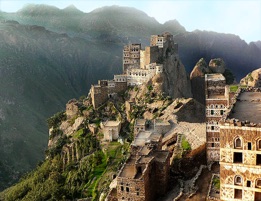News
14 september 2013
And Yemen, what have we done for Yemen and its people?
At little more than 2000 km from Damascus, Yemen faces one of the worse food crises of its history that threatens the lives of around 10 million people or half of its population. Currently, Yemen is one of the countries where the proportion of children suffering from stunting is the highest in the world (more than 50%).
But Yemen is none other than this «Arabia Felix» (Happy Arabia) that was hailed by Pliny the Elder more than 2000 years ago when it was renowned for its mountains where water was in abundance and for its sophisticated irrigation system. It was a country of striking beauty where one could still travel safely at the start of the 1980s, even if some «tribal» zones were already known to be unstable.

How did today’s dramatic situation occur which now requires the mobilisation of humanitarian organisations and has become the object of a joint appeal by the United Nations Office for the Coordination of Humanitarian Affairs (OCHA) and the World Food Programme (WFP) [read]
To understand this, one should remember that Yemen was under more than 30 years of corrupt and inept dictatorship by the regime of Ali Abdullah Saleh who was overthrown in February 2012. Immediately after loosing his power, Saleh travelled to the US for healthcare and later opened a museum in Sana’a to glorify his long period in power... His son, Ali Ahmed, general of the Yemeni army, was made ambassador of Yemen to the United Arab Emirates by the new government in May 2013... Estimates of the wealth embezzled by Saleh and his friends are in dozens of billions of US dollars, held on accounts abroad.
The more than thirty years of Saleh’s dictatorship has seen civil war during the 90s which resulted in the re-unification of the two Yemen (the North, capital Sana’a and the South, capital Aden), a long period of insecurity in large parts of the country (numerous kidnappings, skirmishes between rebels and the army) as well as a fight of the Saleh government, supported by the US, against Al Quaeda, after 2001.
From an economic point of view, the country has progressively become highly dependent on neighbouring oil countries, as a large proportion of Yemenis went to those countries to become migrant workers during the 70s. Despite the discovery of oil deposits, which are nearing depletion, the country is without public services worth mentioning (health, education, etc.).
Yemeni agriculture has been left to itself and the government authorised the development of the cultivation of qat (a drug in the shape of leaves to be chewed, of which part is exported) which uses a large share of the available land and water, and contributed to the depletion of aquifers (the level of wells has been continuously reducing over the years, and the population of Sana’a has to suffer from a chronic shortage of water). Despite having been warned several times about the issue, including by FAO, the government remained inactive.
This scenario was clearly to end in a disaster that will lead to an incalculable number of deaths. However, who has ever tabled the idea to punish Saleh? Who supported his regime? What was done seriously to help Yemen outside maybe the help the country obtained to fight against rebels and terrorists?
Yemen is unfortunately just one example among many other perpetuating corrupt regimes who do nothing to improve the living of their population, whose inaction is the cause of millions of deaths all over the world, and against whom no-one really speaks out seriously.
Luckily, there is Syria so that the international community can attempt to salve its conscience. But will it succeed in the eyes of millions of people who are in a situation of vulnerability and who see their children die or hardly survive, because of hunger, in health conditions that threaten their future development?
Last update: September 2013
For your comments and reactions: hungerexpl@gmail.com




